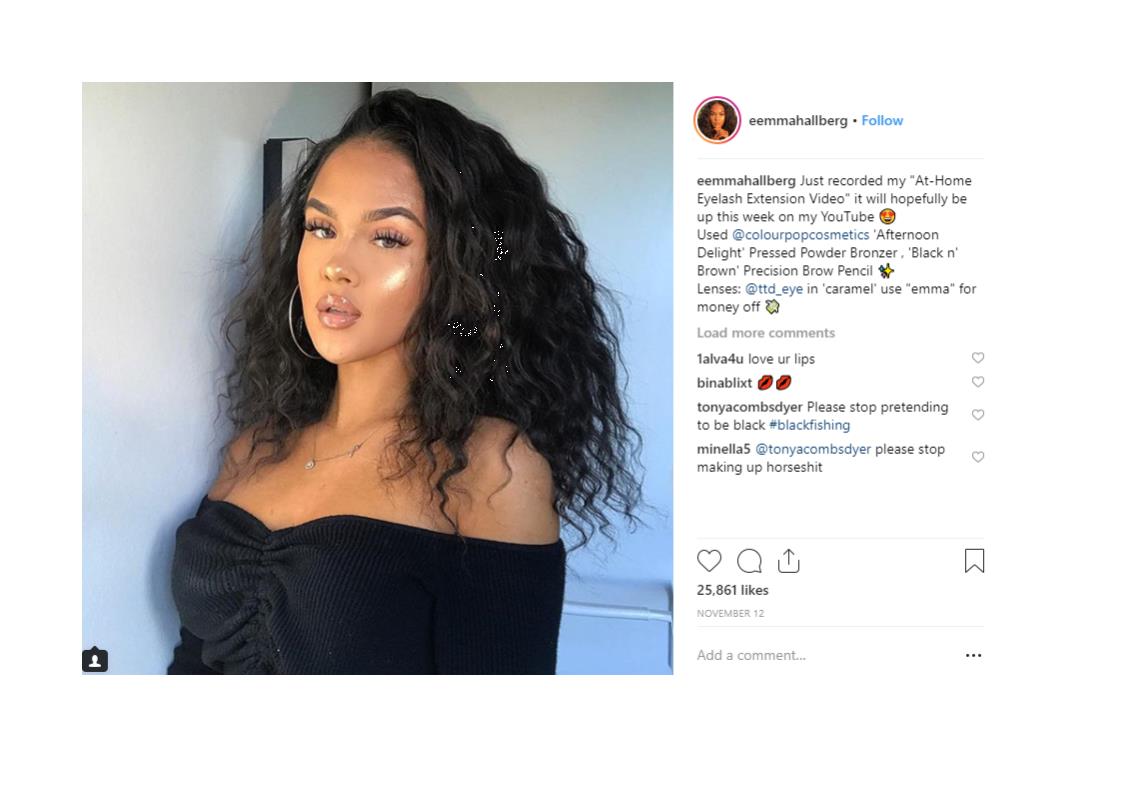The online blogger sphere is no stranger to controversy. An inappropriate post by a blogger can heighten or cripple their follower count and go viral for all the right or wrong reasons. While many of these controversies are inconsequential enough that we never hear about them, one controversy has created shock-waves across social media. White, female ‘influencers’ are donning blackface and emulating black women and black culture on their Instagram accounts.
The exposure of this disturbing trend (dubbed “blackfishing”, a play on words of the term “catfishing”), is headed by the vilification of Emma Hallberg on Twitter. Hallberg, under her username @eemmahallberg, has amassed 245k followers on Instagram by blackfishing. She presents herself as a different race and profits from an increased follower count, leading to sponsorships, work opportunities and collaborations.
In a Q&A on her YouTube channel, the Swedish model confessed that she is in fact white; yet in the photographs she posts on Instagram, there is no trace of whiteness in her appearance. The colour of her foundation is a shade of brown far darker than her own white skin as seen in the revelatory YouTube video. Her hair, although naturally straight, is made to look kinked and tightly curled in many photos. Her lip fillers give a far plumper appearance than is natural to white women, as are her extreme curves which it is suspected she digitally edits in.
This attempt at profiting from the beauty of black women is not an isolated occurrence. Other bloggers blackfishing include Vicky Waldrip (@imwoahvicky), a white American teen who notoriously claimed she was black in 2017, and Mika Francis (@mikafrancis).
 Many cite the Kardashian-Jenner clan, titans of current pop culture, as accountable for the trend. Their multi-billion pound empire owes its existence to the family’s pursuit of beauty by similar means as the bloggers. They surgically and digitally alter their faces and bodies to mimic black women. Kylie Jenner’s monumental net-worth of almost one billion pounds aged 21 is no coincidence.
Many cite the Kardashian-Jenner clan, titans of current pop culture, as accountable for the trend. Their multi-billion pound empire owes its existence to the family’s pursuit of beauty by similar means as the bloggers. They surgically and digitally alter their faces and bodies to mimic black women. Kylie Jenner’s monumental net-worth of almost one billion pounds aged 21 is no coincidence.
It comes as no surprise that many of the family members have been embroiled in scandals about the appropriation of black culture. Kim Kardashian was accused of blackface in 2017 after her skin was digitally darkened in pictures posted on her Instagram advertising her beauty brand. Kendall and Kylie Jenner’s clothing range “Kendall + Kylie” has been accused of appropriating black culture by featuring dead black rappers Biggie and Tupac with pictures of the white sisters printed over them (without permission from either rappers’ estates). Both Kylie Jenner and Khloé Kardashian have been accused of copying the original designs of black designers in their clothing lines ‘The Kylie Shop’ and ‘Good American’ respectively. This is only a small selection of times the Kardashian-Jenner’s have appropriated black culture.


But is there anything to be said in defence of the bloggers? It’s no crime, surely, to admire the beauty of others? To emulate those you look up to? Some are saying in their defence that imitation is the highest form of flattery and we are certainly all guilty of copying the styles of those we deem to be beautiful.
Yet dangerously, this line of argument casts a blind eye to the racial inequality blackfishing feeds off. To understand the roots of the trend requires reflection on the history of oppression suffered by black people in western culture. Enslavement of black people brought with it degradation of their humanity, it being enshrined in law that black people were worthless, inferior to their white superiors – an idea that penetrated every echelon of culture and society, including attitudes to beauty. Whilst black women were stripped of their humanity and reduced to their sexuality, their darkness and ‘otherness’ was what defined beauty in western culture as the paleness of white women.
 While colonial laws and orders of society are long gone in the shadow of the civil rights movement, it would be naïve to believe that gone also are their effects. Blackfishing illustrates colonial legacy in modern society as white women exploit all the ploys of masquerading as black, but can safely retire to the convenience of being white without having to face any of the discrimination faced by black women.
While colonial laws and orders of society are long gone in the shadow of the civil rights movement, it would be naïve to believe that gone also are their effects. Blackfishing illustrates colonial legacy in modern society as white women exploit all the ploys of masquerading as black, but can safely retire to the convenience of being white without having to face any of the discrimination faced by black women.
White bloggers like Emma Hallberg and celebrities like the Kardashian’s and Jenner’s sustain their follower counts by exploiting the reductive stereotypes that emerged from slavery. It’s worth noticing that when people like Emma are photographed as their white selves they’re sweet and innocent, the white girl next door. But when they pose as their black alter-ego, they’re seductive and highly sexualised, with alluring eyes, pouting lips and curves for days. They are perpetuating the long standing stereotypes and further marginalise those they imitate.
Georgie Wardall

